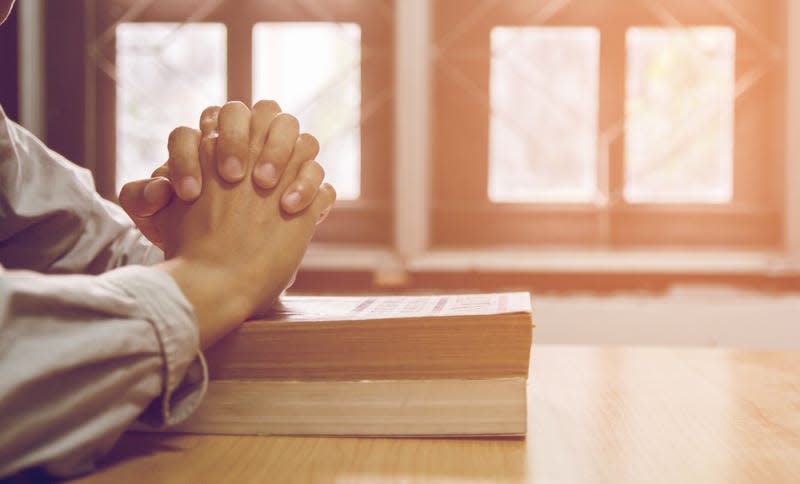Faith Leaders And Organizers Unite On Reproductive Freedom For Roe's 50th Anniversary

Religion and abortion are two dinner table topics you’ve probably been taught to avoid. But ahead of the 50th anniversary of the Supreme Court’s historic Roe v. Wade decision, these religious leaders and faith-based organizers are refusing to keep quiet about it any longer.
On Wednesday, the group representing a variety of religions, including Judaism, Christianity, Islam, and Hinduism, gathered at a virtual town hall to push for abortion rights.
Read more
Aside from Halle Bailey, Here Are Other Black Disney Actors and Characters We Love [Update]
The Best TV Series, Movies of 2022 to Binge Before the Year Ends [UPDATED]
Megan Thee Stallion Becomes 1st Black Woman to Land Forbes 30 Under 30 Cover
“I am here along with these esteemed colleagues to publicly challenge this false dichotomy of faith versus abortion,” says Reverend Amanda Hambrick Ashcraft. “I’m here as a Baptist minister to remind us that on an individual level, people have abortions because of their faith. And on a systemic level, we should all fight for full abortion access.”
Hambrick Ashcraft along with the other people of faith at the event, argue that conservatives have been allowed to dominate the narrative around faith and abortion for too long.
Are You Really Pro-Life?
For example, Jeanné Lewis, CEO of Faith and Public Life says that criminalizing abortion care, while pushing for things like the death penalty, runs directly against her religious convictions as a Catholic.
“Some of our religious institutions push to criminalize those who seek or need abortion care, even to save their own lives,” says Lewis. “While those same religious institutions legitimize and sometimes endorse violence and murder through war, the death penalty, systemic racism, divesting from health care and poverty. At best, it’s inconsistent. At worst, it’s hypocritical.”
Lewis is hardly the first Black faith-based organizer to bring-up the hypocrisy of folks on the religious right who oppose abortion. US Senator Raphael Warnock, who is senior pastor at the historic Ebenezer Baptist Church, spoke out about abortion at his Mother’s Day service last May.
“To be anti-abortion does not make you pro-life. Especially if you will not stand up for the lives of our children once they are here,” said Rev. Warnock, who was endorsed by NARAL.
Black Protestants have consistently polled as more supportive of abortion access than their white counterparts. In July, a Pew Research study, found that about two-thirds of Black protestants disapproved of the Supreme Court’s decision to overturn Roe v. Wade.
A March Pew poll of Black Catholics, like Lewis, found that roughly 71 percent believed that abortion should be legal in all or most cases.
Lewis says that there’s definitely room for more discussions around abortion access in the Black faith community. But she says that doesn’t mean important conversations aren’t taking place.
“I think that there are plenty of conversations in Black faith spaces about what it means to be a parent, what it means to reproduce and what it means to care for a family,” says Lewis. “When we talk about inside conversations we have as Black people, they are often much more complicated... and abortion is one small part of that.”
Religious Minority Groups Are Left Out of The Abortion Conversation
Faith leaders and organizers at the town hall from religious minority groups in the U.S., said that they also felt like they were excluded from the dominant conversation around faith and reproductive justice.
“I cannot practice my religion in the way that was intended to because it says in Exodus that people who can become pregnant have the opportunity the right and sometimes the need to obtain this procedure,” says Rabi Kelly Levy.
Levy’s argument that Jewish teachings support the right to an abortion, isn’t niche. In Kentucky, three Jewish women sued the state for their abortion ban claiming it violated their religious liberty.
“While a fetus is deserving of some level of respect under halakha, the birth giver takes precedence. Jews have never believed that life begins at conception,” read the lawsuit, according to the AP.
Ria Chakrabarty, Policy Director, Hindus for Human Rights, Says that abortion bans also infringe on the religious rights of Hindus in the United States. Some of the most recent polling we have, suggests that roughly 68 percent of Hindus in the United States believe that abortion should be legal in all or most cases.
“Hindu traditions encourage followers to question accepted wisdom, make their own choices, and face those consequences,” says Chakrabarty. “In this sense, then, abortion bans interrupt the way Hindus are allowed to practice their faith in the United States, Hindus are not allowed to make a conscientious decision about their reproductive health.”
In the Islamic faith tradition in the United States, opinions about abortion are more mixed, says Aliza Kazmi, Co-Executive Director of the Muslim Reproductive Rights Advocacy Group, Heart to Grow. “We know that at least 56% of Muslims in America believe abortion is a basic right,” says Kazmi.
Abortion bans also pose a direct threat to Muslim communities, says Kazmi.
“Muslims are disproportionately targeted by policing, surveillance and criminalization. Expanding the state’s control over our bodies is an added threat to our rights to privacy as well as religious freedom,” she says.
Making the broader public hear from people of faith who don’t share anti-abortion sentiments is vital, says Sheila Katz, CEO of National Council of Jewish Women.
“For too long the country has allowed a small but loud group from the religious right to dominate the narrative around abortion and religion. So we ask them, whose religious freedom are you trying to protect,” says Katz? “Not mine.”
More from The Root
Sign up for The Root's Newsletter. For the latest news, Facebook, Twitter and Instagram.

